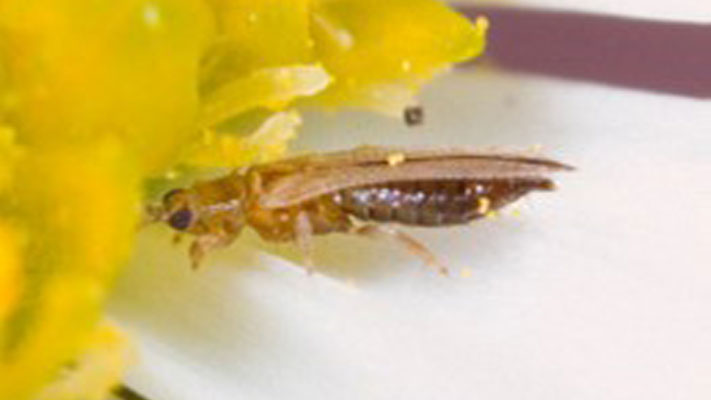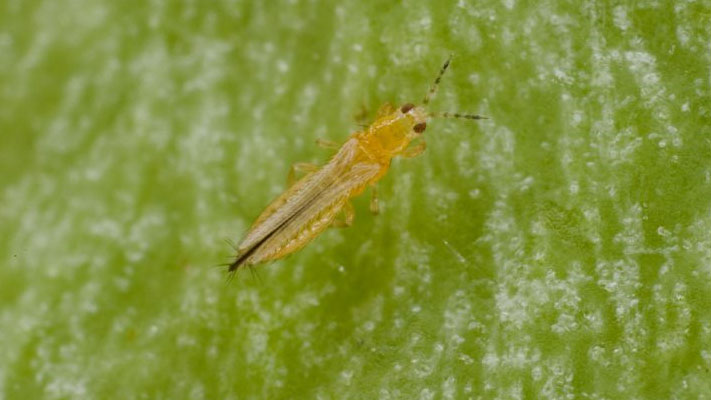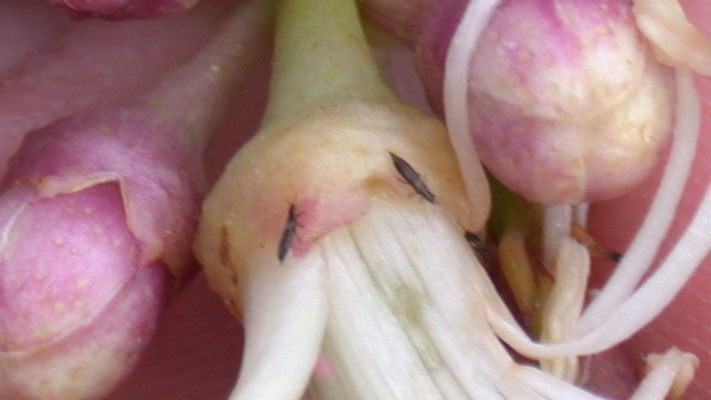Onion Thrips
Refer to the links below on different thrips species.

Description
Onion thrips are slender and small (1.0-1.2 mm long), adults are pale yellow to light brown becoming darker in winter, with wings that are fringed with long hairs. Nearly all onion thrips are females, males are very rare if present at all, and the larvae are similar in shape to adults but are wingless and paler in colour.
Prevalent during mid-summer, adult and nymph stages feed on plants by piercing the leaf surface and sucking sap. Damage produces silvery patches on the leaves and in severe cases, leaves may wither and the whole plant may appear silvery, causing the crop to ripen prematurely and reduce yields. In onions, thrips can enter harvested bulbs and breed, reducing the marketability of bulbs.
Control
Practising good crop hygiene through the removal of potential host plants around crops is important to reduce onion thrips populations.Crops should be monitored regularly for onion thrips and control measures should be implemented before numbers peak.
Onion thrips may develop resistance to insecticides quickly, therefore reliance on insecticides alone should be minimised.
At present there are few insecticide control options for onion thrips in onions. Movento ® is an effective option, including where resistant populations have developed to other compounds. Given the systemic nature of Movento® it is effective at controlling hidden thrips and is best applied to juvenile stages of onion thrips.
References
Atlas of Living Australia (viewed Oct 2019), ‘Thrips tabaci’, https://bie.ala.org.au/species/urn:lsid:biodiversity.org.au:afd.taxon:ecc99341-8246-4f00-a951-a16fb8483269#overview
Bayer CropScience (Viewed Oct 2019), ‘Users guide for onions: Controlling onion thrips with Movento®’, file:///C:/Users/User/Downloads/Movento%20users%20guide%20for%20onions.pdf
Mo, J (2006), ‘Onion thrips in onion – identification and monitoring’, NSW Department of Primary Industries, Primefact 228, https://www.dpi.nsw.gov.au/__data/assets/pdf_file/0003/75720/Onion-thrips-in-onion-identification-and-monitoring.pdf
Mo, J (2006), ‘Pesticide resistance in onion thrips’, NSW Department of Primary Industries, Primefact 260, https://www.dpi.nsw.gov.au/__data/assets/pdf_file/0011/97742/Pesticide-resistance-in-onion-thrips.pdf
Mo, J (2006), ‘Seasonal patterns of onion thrips in onion – mass invasions or gradual population build up’, NSW Department of Primary Industries, Primefact 248, https://www.dpi.nsw.gov.au/__data/assets/pdf_file/0010/92935/Seasonal-patterns-of-onion-thrips-in-onions.pdf
Queensland Government (2018), ‘Thrips’, https://www.business.qld.gov.au/industries/farms-fishing-forestry/agriculture/crop-growing/pests-field-crops/thrips








